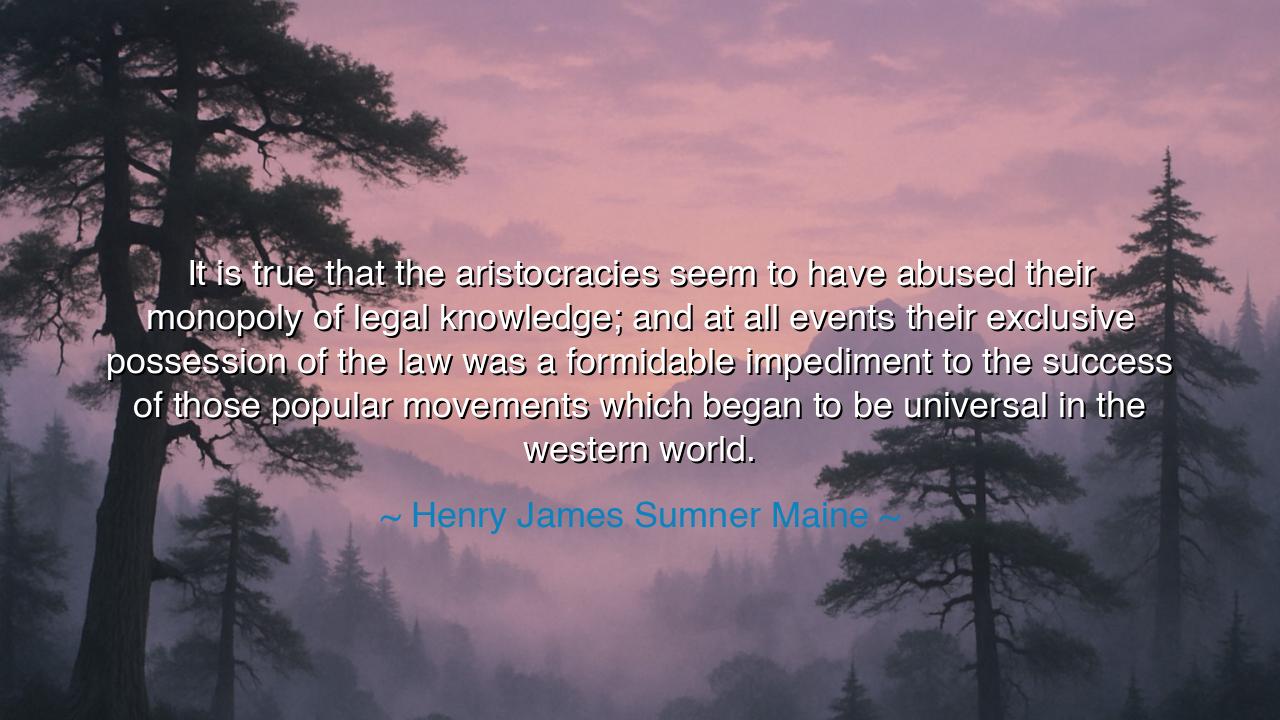
It is true that the aristocracies seem to have abused their
It is true that the aristocracies seem to have abused their monopoly of legal knowledge; and at all events their exclusive possession of the law was a formidable impediment to the success of those popular movements which began to be universal in the western world.






When Henry James Sumner Maine wrote, “It is true that the aristocracies seem to have abused their monopoly of legal knowledge; and at all events their exclusive possession of the law was a formidable impediment to the success of those popular movements which began to be universal in the western world,” he was not merely describing a historical observation — he was unveiling one of the great struggles in the evolution of civilization: the conflict between power and knowledge, between the few who possess the instruments of law and the many who live under its weight. His words ring with both sorrow and triumph, for they tell of an age when law, which should have been the guardian of justice, became the fortress of privilege.
The origin of this insight lies in the 19th century, a time when Sir Henry Maine, a great legal historian and jurist, sought to explain how societies progress “from status to contract” — from rigid hierarchies toward individual freedom. In his work Ancient Law, he traced the development of legal systems from the ancient world to the modern era, showing how law had long been the private domain of the aristocracy, the educated and the powerful. These ruling classes, by keeping legal knowledge within their own hands, maintained dominance over those who lacked it. The law, which should have been the light of fairness, was shrouded in the shadow of monopoly. Thus, Maine recognized that the people’s ignorance of their own rights had long been one of the greatest obstacles to liberty.
In his words we hear the echo of ancient societies — in Rome, where the Pontifex Maximus and his order held secret the formulas of law, and where only after centuries were these mysteries published for the people to see in the Twelve Tables. Before that moment, justice itself was a privilege, not a right. The common man could not plead his cause without a priest to interpret divine law, nor could he defend himself against the nobility’s cunning. The aristocracy’s monopoly of legal knowledge was thus not only political, but spiritual — for to control the law was to control the soul of the people.
Maine’s lament is not a condemnation of knowledge, but of its hoarding. When a class or a caste guards learning as treasure rather than sharing it as light, it forges invisible chains that bind the many. Every age has known this danger. In medieval Europe, the law was written in Latin, a language of scholars and priests, inaccessible to the farmer or craftsman. Only with the rise of universities, printing presses, and the popular movements of the Enlightenment did this veil begin to lift. The people began to read, to question, to challenge the sanctity of those who ruled by knowledge alone. The western world, stirred by the winds of revolution, demanded not only bread and freedom, but also access to understanding — for only when a man knows the law can he stand upright beneath it.
Maine’s words carry a moral lesson that transcends his time. He warns that whenever knowledge becomes the instrument of exclusion, progress halts. The “success of popular movements,” he writes, depends not merely on passion or protest, but on education — on giving the people the wisdom to govern themselves justly. A society cannot be truly free if its citizens must rely on interpreters to understand their own rights. Freedom, without understanding, is like a bird whose wings have been bound by parchment. The law must be a mirror, not a mystery; a teacher, not a tyrant.
One might see this lesson reflected in the story of Magna Carta — that ancient agreement forced upon King John by his barons in 1215. Though its words were written in Latin and understood by few at the time, its spirit became a seed of freedom. It declared that even kings were bound by law, and in time, its meaning grew to include every commoner. What began as a negotiation among nobles became a beacon for all humankind. This is the very journey Maine describes — the transformation of law from an exclusive instrument of power into a shared covenant of justice.
Let this truth be passed down to all generations: knowledge must never be the property of the few, for when it is, justice becomes corrupted and freedom becomes illusion. Teach the law to the people, that they may know both their rights and their duties. Build schools, publish truth, and make wisdom common as the air — for only then can the foundations of tyranny crumble.
And so, as Henry Maine reminds us, the law is not meant to be a fortress for the privileged, but a bridge for the people. It is not to be guarded by the powerful, but guarded from the powerful. For when the law belongs to all, the people rise; but when it belongs only to some, even the noblest society stands on the brink of decay.






AAdministratorAdministrator
Welcome, honored guests. Please leave a comment, we will respond soon